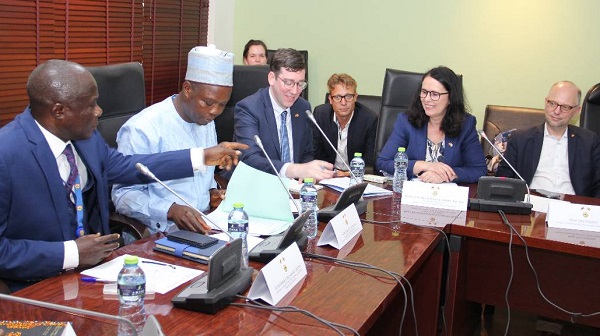
German legislators visit Ghana’s Parliament
An eight-member delegation from the Committee on Legal Affairs of the German Parliament (Bundestag) paid a study visit to the Parliament of Ghana last Thursday.
The legislators engaged in a joint meeting with their colleague Ghanaian MPs on the joint committees on Constitutional, Legal and Parliamentary Affairs Committee, Judiciary Committee, Subsidiary Legislation Committee and the Foreign Affairs Committee.
The visit was to allow the Bundestag MPs to gain in-depth knowledge on the workings of the four committees of Ghana’s Parliament and engage members on issues relating to the rule of law in Ghana.
They also held discussions on transparency and accountability in the public and private sectors, fight against corruption, human rights and correctional facilities.
Led by the Chairman of the Committee on Legal Affairs, Elisabeth Winklemeier-Becker, the visit was also intended to create the platform for networking between the MPs from Germany and Ghana, with the aim to deepening relations between the two legislatures of the two countries.
The delegation was accompanied by the German Ambassador to Ghana, Daniel Krull, and other supporting staff from the Bundestag.
Visit
Welcoming the delegation, the Chairman of the Constitutional, Legal and Parliamentary Affairs, Kwame Anyimadu-Antwi, said Ghana had had linkage with Germany but it was the first time a delegation from the Germany Parliament had visited Ghana.
“I have always been a member of this committee ever since I became a member of Parliament 12 year ago, we also have not had a Ghana committee visiting Germany either and I think this is historic,” he said.
“We are extremely to have you (delegation Chairman) and your team in Ghana,” he said.
Tenets of democracy
Briefing the delegation on the tenets of Ghana’s democracy, the Ranking Member of the Constitutional, Legal and Parliamentary Affairs, Bernard Ahiafor, highlighted the role of the three arms of government- the Executive, the Judiciary and the Legislature—and their functions under the 1992 Constitution.
He also touched on the essence of rule of law, accountability, open government as well as just law and accessible and impartial justice as some of the good tenets of Ghana’s democracy.
Increasing women MPs
A member of the Constitutional, Legal and Parliamentary Affairs Committee, Ursula Owusu-Ekuful, said 45 out of the 275 legislators of Ghana’s Parliament were women, the highest in Ghana’s history.
With women representing 51 per cent of Ghana’s population, she said major political parties must worked towards improving their representation of women at the selection stage and assist them to win the general to allow more women would be elected.
She opined that having more women legislators would add to the “quality of debate in the House.”
The MP for Ablekuma West also spoke about how the government was leveraging digital technology to fight corruption and address leakages of revenue from government purse into private pockets.
Leader
Mrs Winklemeier-Becker said the visit by her team, which had already visited Senegalese Parliament, was to allow them to have an exchange and learn from colleague MPs to discuss topics that “impacts everybody’s life everywhere especially rule of law.”
She noted that the legal framework in Ghana was actually decisive but it must create space for positive, constructive development.
“And If the citizens in the country and indeed foreign investors are able to trust, then they will trust in the ability to build better. They need to see the real value of investment and development and that is important thing we can work on.
“And at the same, the law is vital in everyday life of citizens in providing access to justice because the law can only be as good as it is on paper but must be enforced to be effective otherwise, we have not the rule of law but the rule of the stronger,” she said.
The MP added that the law must be there as an institution in order to help the weaker in society.
Ms Winklemeier-Becker added she was delighted that Germany and Ghana’s legislatures would have the opportunity for exchange programmes on human rights and administrative justice
